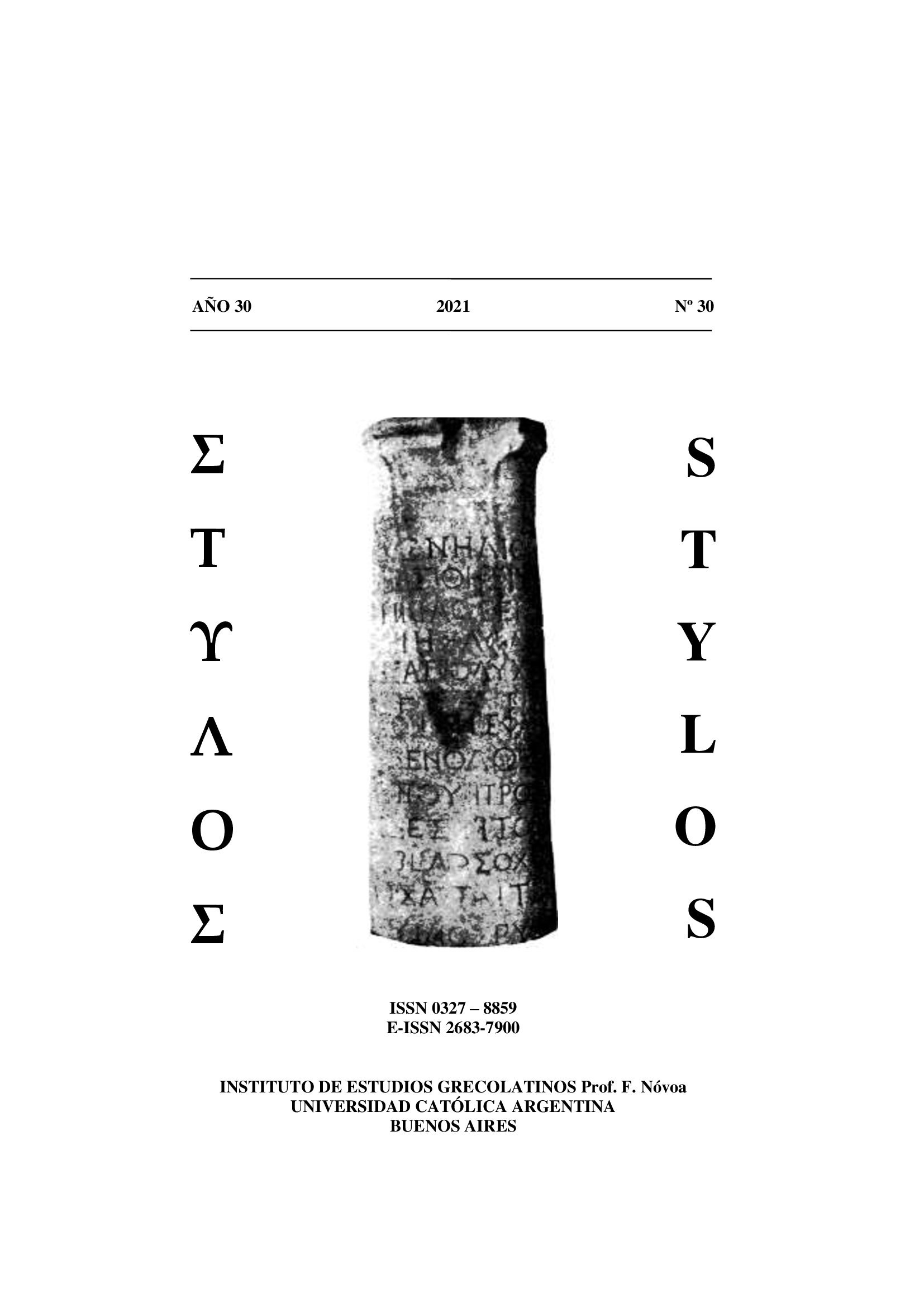CONSIDERACIONES EN TORNO A LAS IMPLICACIONES METAFÍSICAS VIRGILIANAS EN GIORDANO BRUNO
DOI:
https://doi.org/10.46553/sty.30.30.2021.p200-240Keywords:
Virgil – Giordano Bruno – Aeneid – mens – spiritus.Abstract
The central purpose of the present work is to give an account of the meaning of the reference to the passage of the katábasis of Aeneas, found in Aeneid VI 724-727, on metaphysical aspects of Giordano Bruno’s work. To accomplish this, two previous objectives are taken into account: first, analyzing certain passages of Virgil's work, raising the possibility of conceiving a Virgilian philosophy and, secondly, making a journey on the reception and transformation of meaning around Aeneid VI 724-727 from the 1st to the 15th century in order to register milestones in the reception of this passage until reaching Giordano Bruno. When analyzing the works of this author in relation to the aforementioned passage, we try to account for its relevance in Nolan’s work.Downloads
References
ARATO, Fenómenos, Madrid: Gredos, 1993.
BRUNO, G., De la causa, principio e uno, a cura di G. Aquilecchia, To-rino: Einaudi (A), 1973.
BRUNO, G., Opera latine conscripta, publicis sumptibus edita, recense-bat [F. Fiorentino F. Tocco, H. Vitelli, V. Imbriani, C. M. Tallari-go], 3 volumi in 8 parti: Neapoli-Florentiae (=F; TV; IT), 1879-1891. la causa, principio e uno, a cura di G. Aquilecchia, Torino: Einaudi (A), 1973.
BRUNO, G, Mundo, magia, memoria, Madrid: Biblioteca Nueva, 1997.
BRUNO, G. De la causa, principio y uno, Buenos Aires: Losada, 2010.
HOMERO, Ilíada, Madrid: Gredos, 2006.
LUCRECIO, Acerca de la naturaleza de las cosas, Buenos Aires: Las Cuarenta, 2019.
MACROBIO, Comentario al «Sueño de Escipión», Madrid: Gredos, 2006.
MAURUS SERVIUS HONORATUS [SERVIUS], In Vergilii Aeneidem commen-tarii, Georgius Thilo, Hermannus Hagen (ed.), 3 vol., Lipsiae in aedibus B. G. Teubneri, 1881–1902.
TEOCRITO, Bucólicos griegos, Madrid: Gredos, 1986.
ADLER, E. Vergil’s Empire. Political Thought in the Aeneid, Lanham-Boulder-New York-Oxford: Rowman & Littlefield Publishers, Inc., 2003.
ALBANESE, L. “Bruno, Virgilio e lo Spirito Santo”, Bruniana & Campa-nelliana 2000 6-1: 181-188.
ALDEN SMITH, R. Virgil, West Sussex: Wiley-Blackwell, 2011.
BAUZA, H. “Virgilio y el orfismo”, Nova tellus 2015 32-2: 215-269.
BERNABE, A. Textos órficos y filosofía presocrática. Materiales para una comparación, Madrid: Trotta, 2004.
BREMMER, J. “ The Golden Bough: Orphic, Eleusinian, and Hellenistic-Jewish Sources of Virgil’s Underworld in Aeneid VI”, Kernos. Revue internationale et pluridisciplinaire de religion grecque an-tique, 2009 22: 183-208.
BREMMER, J. Initiation into the Mysteries of the Ancient World, Ber-lin/Boston: Walter de Gruyter GmbH, 2014.
CANONE, E. “Giordano Bruno: Hermeticism and Magic in Wisdom’s Mirror”, Bruniana & Campanelliana, 2004 10-1: 151- !55.
CILIBERTO, M. Il sapiente furore. Vita di Giordano Bruno, Milano: Adoplhi, 2020.
COURCELLE, P. Lecteurs païens et lecteurs chrétiens de l’Éneide, Paris: Institut de France, Mémoires de l’Académie des Inscriptions et Be-lles-Lettres. Nouvelle Série. IV, 1984.
CUMONT, F. “ Comment Plotin détourna Porphyre du suicide”, Revue des Études Grecques, 1919 32 : 113-120.
CUMONT, F. Lux perpetua, Paris: Libraire Orientaliste Paul Geuthner, 1949.
CUOZZO, G. Dal panteismo ontoteologico alla teologia infinitesimal. Con inedita di Vincenzo Gioberti su Giordano Bruno e Nicola Cu-sano, Torino: Nino Aragno Editore, 2007.
GATTI, H. Giordano Bruno e la scienza del Rinascimento, Milano: Raf-faello Cortina Editore, 2001 [1999].
GIESECKE, A. Atoms, Ataraxy, and Allusion. Cross-generic Imitation of De Rerum Natura in Early Augustan Poetry, Zürich-New York: Georg Olms Verlag Hildesheim, 2000.
GIOVANNOZZI, D. “«Porphyrius, Plotinus et alii platonici». Echi neopla-tonici nella demonología bruniana”, Bruniana & Campanelliana, 2000 6-1: 79-103.
GISONDI, G. «Profonda magia». Vincolo, natura e politica in Giordano Bruno, Napoli: Istituto Italiano per gli Studi Filosofici, 2020.
GRANADA, M. A. “«Virgilio y la theologia poetica en el humanism y en el platonismo del Renacimiento” en Faventia, 1983 5-1: 41-64. https://raco.cat/index.php/Faventia/article/view/49778 [Consulta: 27-07-2021].
GRANADA, M. A. “Giordano Bruno y América: de la crítica de la colo-nialización a la crítica del cristianismo”, 197-269. En: M. A. Gra-nada, Giordano Bruno. Universo infinito, union con Dios, perfec-ción del hombre, Barcelona: Herder, 2002.
GRANADA, M. A. “Universo infinito, vicissitudine y «verdadera morali-dad»”, 215-242. En: M. A. Granada, La reivindicación de la filo-sofía en Giordano Bruno, Barcelona: Herder, 2005.
GRANSDEN, K. W. Virgil. The Aeneid, Cambridge: Cambridge University Press, 2004.
GREGORY, T. “Anima del mondo”, Bruniana & Campanelliana, 2006 12-2: 525-535.
HARDIE, P. Virgi’s Aeneid. Comos and imperium, Oxford: Oxford Uni-versity Press, 1986.
HARRISON, S. J. Generic enrichment in Vergil & Horace, Oxford: Ox-ford University Press, 2007.
HORSFALL, N. Virgil, Aeneid 6. A Commentary, Berlin/Boston: De Gruy-ter, 2013.
HORSFALL, N. The Epic Distilled. Studies in the Composition of the Ae-neid, Oxford: Oxford University Press, 2016.
INGBERG, P. “Introducción”, 7-31. En: Virgilio, Bucólicas, Buenos Aires: Losada, 2004.
INGEGNO, A. Cosmologia e filosofia nel pensiero di Giordano Bruno, Firenze: La Nuova Italia, 1978.
JAMES, A. W. “The Zeus Hymns of Cleanthes and Aratus”, Antichthon, 1972 6 28-38.
KRAGGERUD, E. Critica. Textual Issues in Horace, Ennius, Vergil and Other Authors, London-New York: Routledge, 2021.
LOTTI, B. “Spiritus intus alit. La fortuna di un topos virgiliano nel pen-siero britannico d’età moderna”, 141-164. En: L. Bianchi, A. del Prete y G. Paganini, Cartesianisi, scetticismi, filosofia moderna. Studi per Carlo Borghero, Roma: Le Lettere, 2019.
MACKENZIE, T. “Georgica and Orphica: The Georgics in the Context of Orphic Poetry and Religion”, 67-78. En: B. Xinyue y N. Fre-er, Reflections and new perspectives on Virgil’s Geor-gics, London-New York: Bloomsbury Academic, 2019.
MAURY, P. “Le secret de Virgile et l’architecture des Bucoliques”, Let-tres d’Humanité, 1944 3: 71-147.
MORTON BRAUND, S. “Virgil and the cosmos: religious and philosophical ideas”, 204-221. En: Ch. Martindale (ed.), The Cambridge Com-panion to Virgil, Cambridge: Cambridge University Press, 1997.
MRAS, K. “Macrobius’ Kommentar zu Ciceros Somnium. Ein Beitrag zur Geistesgechichte des 5. Jahrhunderts n. Chr.”, Sitzungsberichte der preussischen Akademie der Wissenschaften. Philosophisch-historische Klasse, 1933 6: 232-288.
NAMER, É. Les aspects de Dieu dans la philosophie de Giordano Bruno. Thèse pour le doctorat en philosophie de l’Université de Paris, Paris: Libraire Félix Alcan, 1926.
NORDEN, E. P. Vergilius Maro Aeneis Buch VI, Stuttgart: B. G. Teubner, 1976.
SAUNDERS, T. Bucolic Ecology. Virgil’s Eclogues and the Environmental Literary Tradition, London-New Delhi-New York-Sidney: Bloomsbury, 2008.
SEGURA RAMOS, B. “Introducción”, 7-20. En: Virgilio, Bucólicas - Geórgicas, Madrid: Alianza Editorial, 1997.
SNELL, B. The Discovery of the Mind. The Greek Origins of European Thought, Massachusetts: Harvard University Press, 1953.
SPRUIT, L. “Giordano Bruno and Astrology”, 229-249. En: H. Gatti (ed.), Giordano Bruno. Philosopher of the Renaissance, London-New York: Routledge, 2002.
WILLIAMS, R. D. “The Sixth Book of the ‘Aeneid’”, Greece & Rome. Second Series, 1964 11-1: 48-63.
YATES, F. Giordano Bruno and the Hermetic Tradition, London: Routledge and Keegan Paul, 1964.
Downloads
Published
How to Cite
Issue
Section
License






